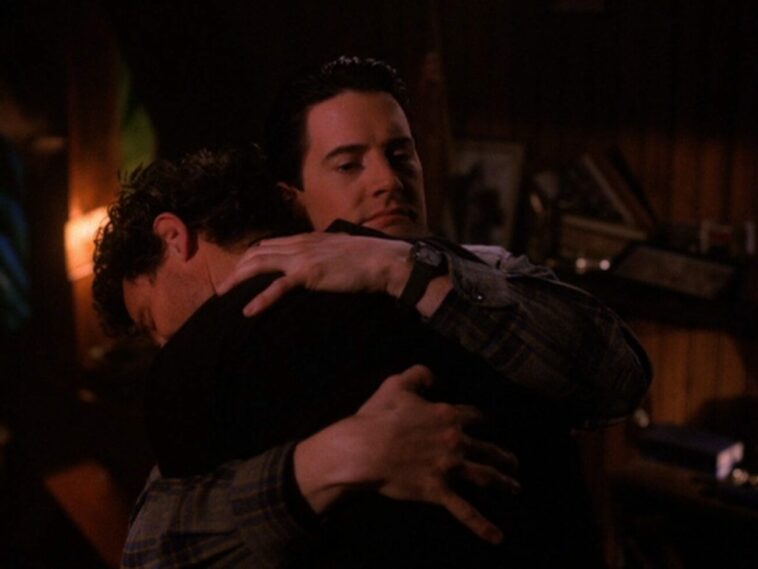Welcome, dear reader, as we continue our original series rewatch of Twin Peaks with a review and analysis of Episode 24, aka S2E17, aka “Wounds and Scars.” This episode marked the return of Twin Peaks after a six-week hiatus. Realistically, at this point, there should have been no one left but us diehards. Ratings on Episode 23, the last episode before the break, hit an all-time low. However, we were also gifted with a return to a Thursday night timeslot, and the ratings on this and the next episode got a nice little bump as a result.
It also helped that we were now clear of all the James-Evelyn nonsense, all the Ben Horne-Civil War nonsense, and all the Little Nicky nonsense. Frost and Lynch were back from their individual projects and paying attention again. Several new storylines kicked off to carry us into the season finale. This episode was Twin Peaks returning to true form.
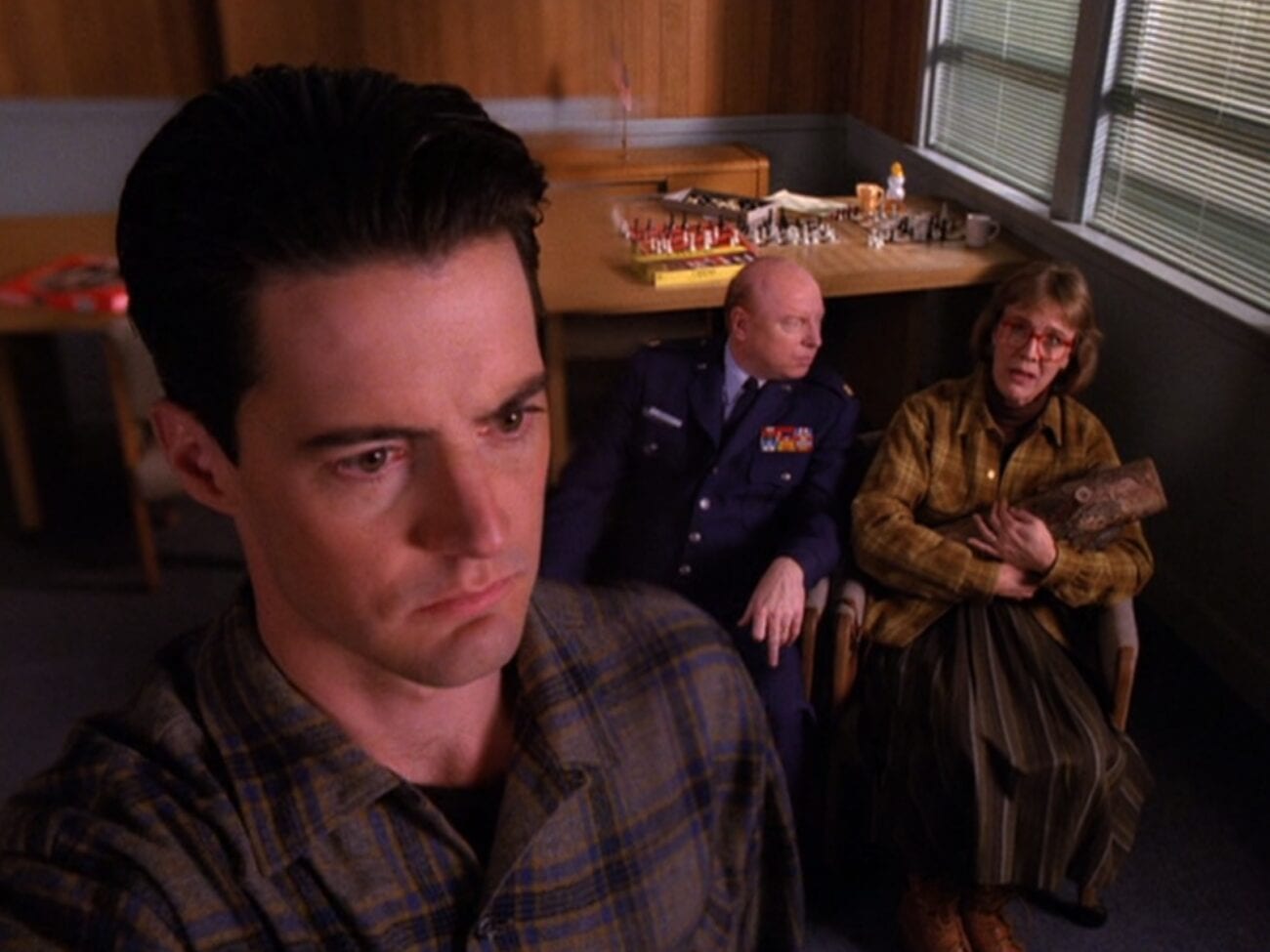
Log Lady Introduction
Sometimes, well, let’s say all times, things are changing. We are judged as human beings on how we treat our fellow human beings. How do you treat your fellow human beings? At night, just before sleep, as you lay by yourself in the dark, how do you feel about yourself? Are you proud of your behavior? Are you ashamed of your behavior? You know in your heart if you have hurt someone, you know. If you have hurt someone, don’t wait another day before making things right. The world could break apart with sadness in the meantime. – The Log Lady, Intro to Episode 24
To me, this is one of the more cryptic Log Lady introductions. Episode 24 actually features Margaret in her first appearance since Dougie Milford’s wedding in Episode 18. And it teams her up with Major Briggs, who hasn’t been seen since Episode 21. When it first aired, this was super-exciting stuff for us diehards, tying together the old mythological threads and the new ones. Time would certainly remember this as the most important moment of the episode. However, the Lynch-penned intro eschews those much-welcomed mythological developments in favor of the personal.
It’s always said that at its core, Twin Peaks is a show about trauma. The trauma of Laura Palmer, passed down from her father, has been closed out—at least until we’ll revisit it through her mother 25 years later. With Leland’s death, we see the departure of BOB, though he promises to kill again. In Episode 23, BOB finally does return, lured by the trauma that Josie Packard is experiencing. At this point in the series, though, BOB is hardly out of sources of garmonbozia.
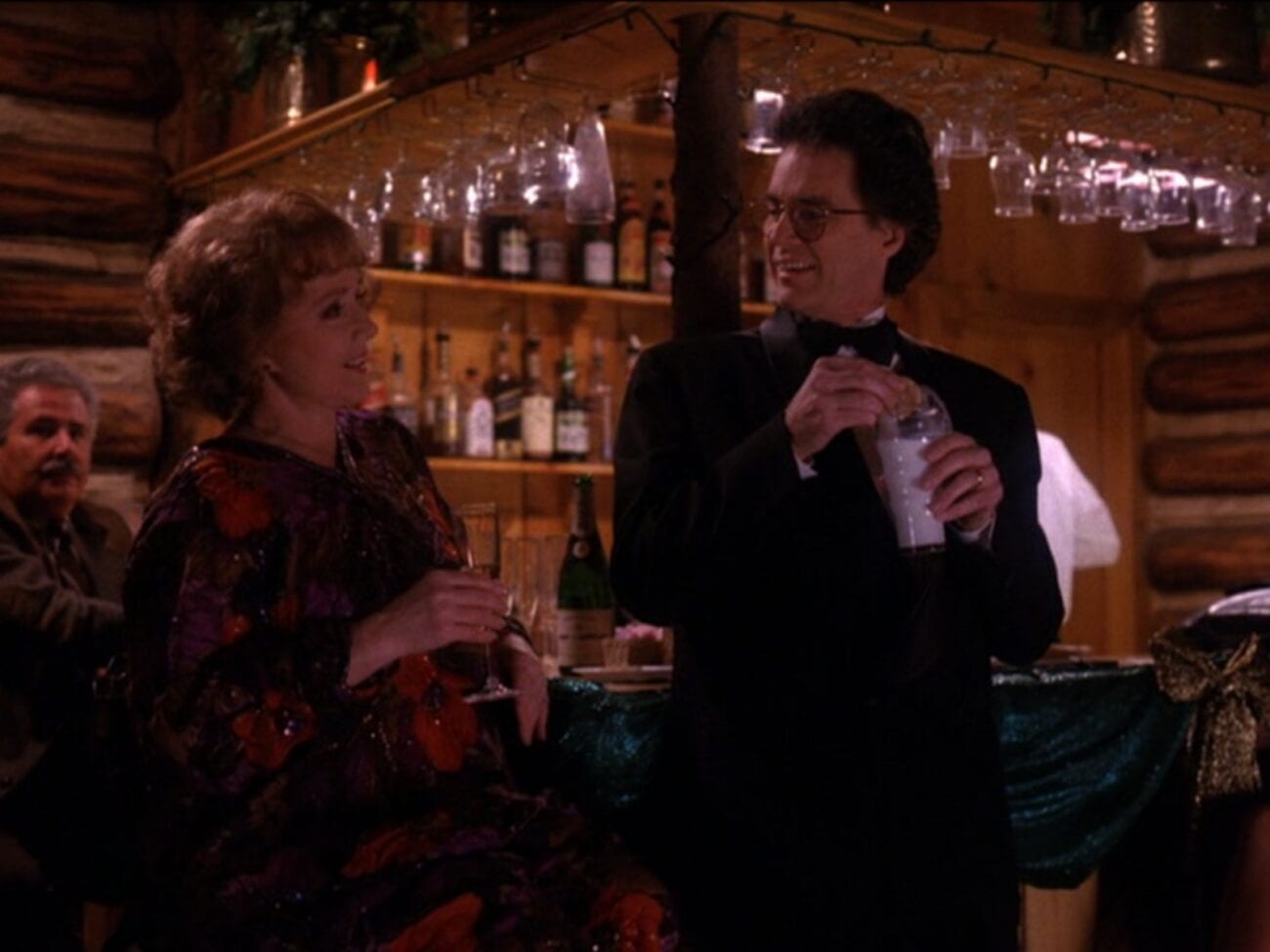
Ben Horne
The usual interpretation is that the Log Lady intro is referencing Ben Horne. He certainly checks off many of the boxes here. He is ashamed of his past behavior. He’s trying to make things right. As he tells Catherine, he’s giving “one of the dirtiest consciences in the entire Northwest” its first scrubbing. There’s always been a lot of speculation as to whether Ben is sincere in his desire to do good, to be good. I choose to believe he is absolutely 100% sincere. Certainly within the confines of Season 2 he is, Mark Frost’s later reimaginings for The Secret History notwithstanding.
All of that is directed at more general sins, though, sins against the entire town. If this introduction is about Ben, who is the specific “someone” that he has hurt? Ben seems to think it is Donna. With his visit to Eileen Hayward in this episode, we kick off a new storyline leading to the revelation that Ben Horne is Donna’s father. However, in the end, Donna is more hurt by the truth than by the lie she has been living. In fact, everyone in both the Hayward and the Horne families is hurt by what Ben is doing, even young Gersten Hayward, as we’ll find out 25 years later. By Episode 29, Ben finally comes around to understanding this, asking Will to “forgive me for what I have done to you.” Heading down this path, Ben has unfortunately confused “feeling good” for “doing good.”
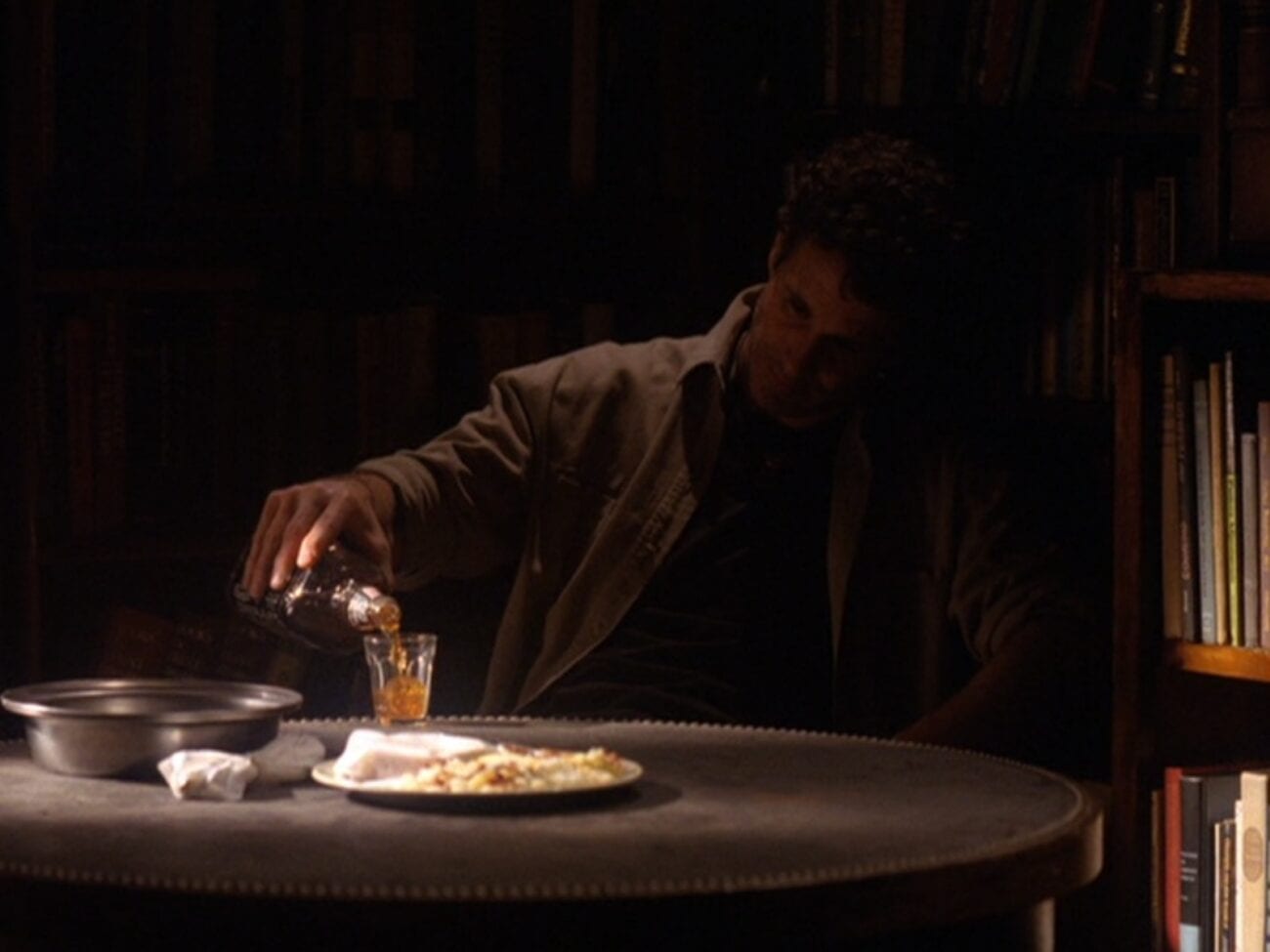
Sheriff Truman
We start out the episode with Sheriff Truman wallowing in drunken misery over Josie’s death. His is certainly a world broken apart with sadness. Margaret could very well be talking about Harry. He has a heap of regrets. He feels he should have gotten Josie away from Twin Peaks. Harry was in denial about the amount of trouble that piling up against her. He was not really listening to her desperate cries for help. Of course, half the time that was her doing, telling him to make love to her to distract him from asking worrisome questions.
In fact, maybe the intro isn’t talking about Harry, but rather about Josie. After all, her last words to Harry in Episode 23 are, “I never meant to hurt you.” Maybe this is the answer to BOB’s taunt in the last episode, “Coop! What happened to Josie!” She is judged by the denizens of the Lodge on how she treated her fellow human beings, found wanting, and given a punishment worse than death—forever trapped as a tortured soul within the wood of the Great Northern Hotel.
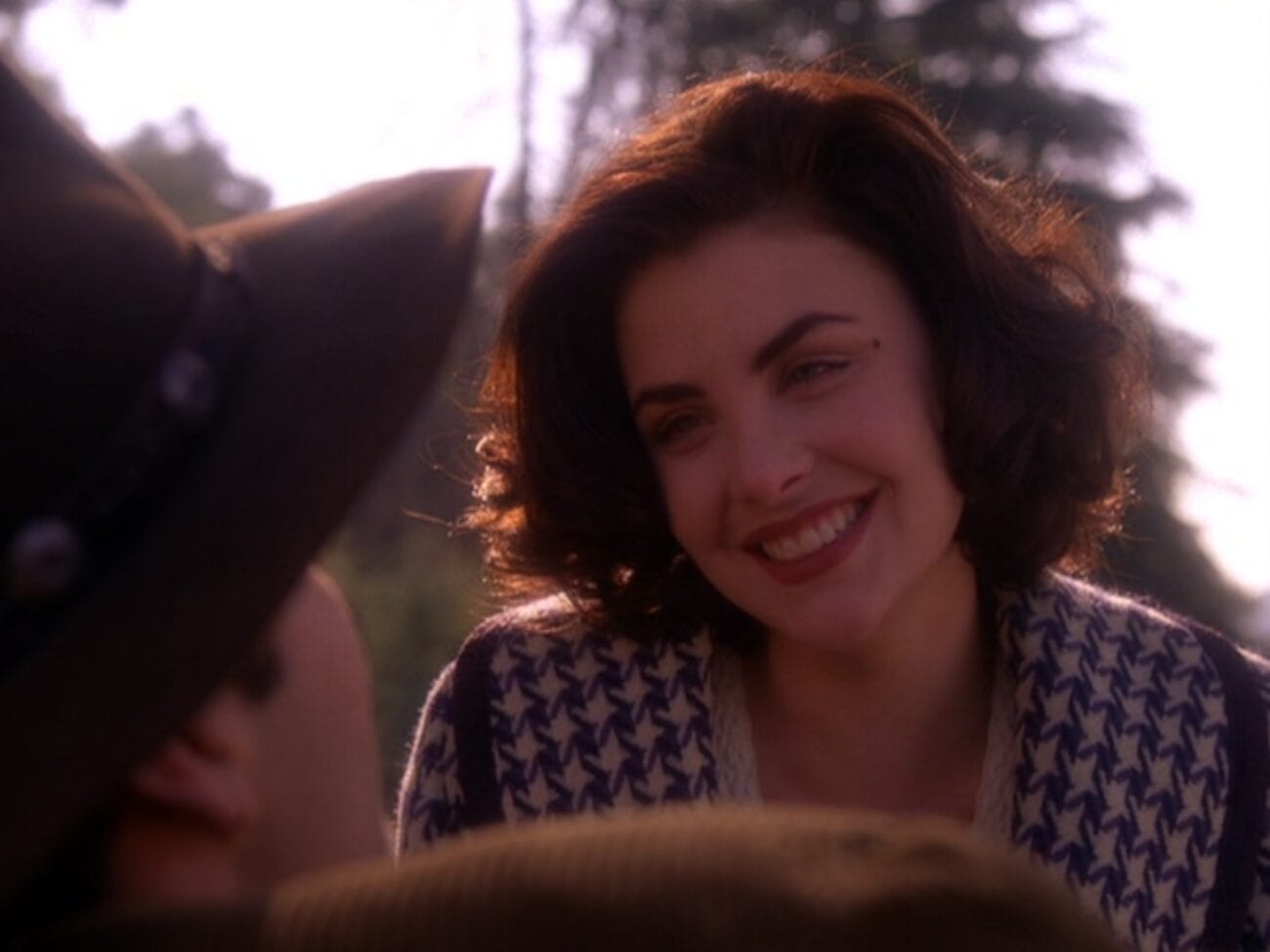
Audrey and Jack
A new love interest for Audrey Horne, John Justice “Jack” Wheeler, is introduced in Episode 23. Now in Episode 24, things begin to ramp up for the two. The original intent going into Season 2 was to follow the sparks leading to a romance between Audrey and Agent Cooper. However, behind-the-scenes jealousy between Lara Flynn Boyle and Sherilyn Fenn put the kibosh on that storyline. The screenplay for the picnic scene from Episode 24 forever documents that original intent:
Wheeler (considerate as always): Audrey. If there’s some other guy, I’ll…
Audrey: There used to be, but…
A long beat. Audrey thinking about Cooper, first love, then, at last…
Audrey (warm and certain): No. There’s not. There’s nobody.
At the start of this episode, Audrey is still referring to Jack as “Mr. Wheeler” in her role as Great Northern concierge. By the end of the episode, they have their first kiss. It feels rushed and shoehorned in because, well…it is rushed and shoehorned in. Lynch and Frost will largely redact all of this in Season 3 and the novels, forgetting the singing cowboy entirely and reimagining an Audrey forever pining away for her “first love.”
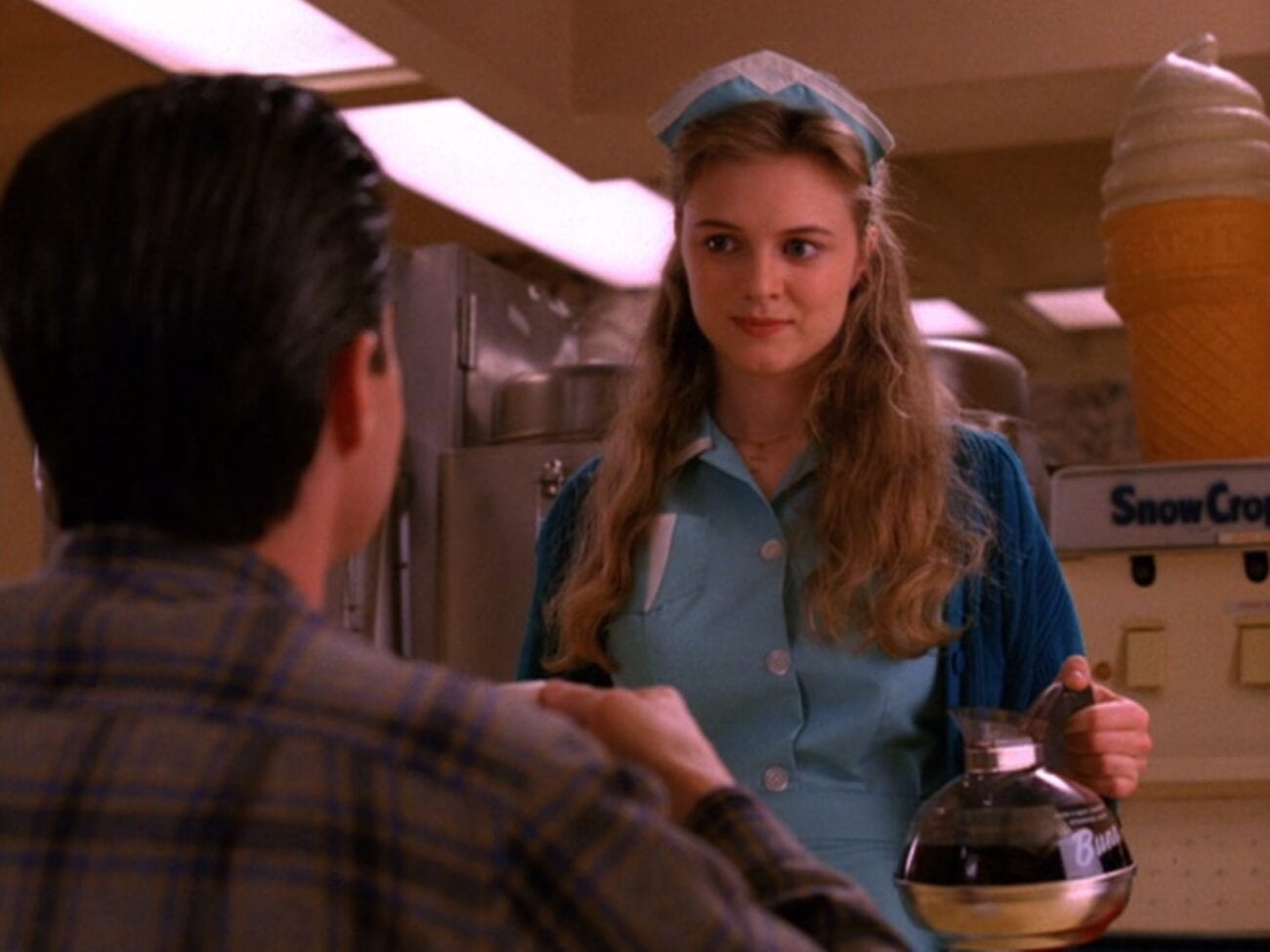
Cooper and Annie
Cooper’s new love interest is also introduced in Episode 23, but in name only. Norma takes a phone call from her sister Annie, who will be arriving by bus the next day. Norma describes her to Shelly as being “from another place in time,” even above and beyond the fact that she’s leaving a convent to come to Twin Peaks. In Episode 24, she shows up at the Double R Diner with a suitcase in hand. She wants no charity, and Norma promises to work her till she drops.
Sparks fly once again for Agent Cooper when he meets Annie, but it’s a totally different reaction than it was with Audrey. All season, the writers have been building up Cooper as suffering from White Knight syndrome, hammering down every nail in that coffin with the release of My Life, My Tapes later in May 1991. He apparently felt an “irresistible urge to rescue every damsel in distress” he meets, as Agent Preston will put it in The Final Dossier years later. He gets a chance to rescue Audrey from the clutches of One-Eyed Jacks in Episode 12, but ultimately, Audrey is just not the damsel-in-distress type.
When Cooper catches a glimpse of the scar on Annie’s wrist, it’s almost as if he is aroused by the sight. He immediately has to save her from even the minuscule worry that she has served him a cup of coffee that is a little too strong. No, he assures her, she made it just right. Their chemistry is a perfect match—the two quirky out-of-towners from another place in time. However, it’s also a volatile sort of chemistry, her “damsel” catalyzing his “knight” and eventually dooming them both.
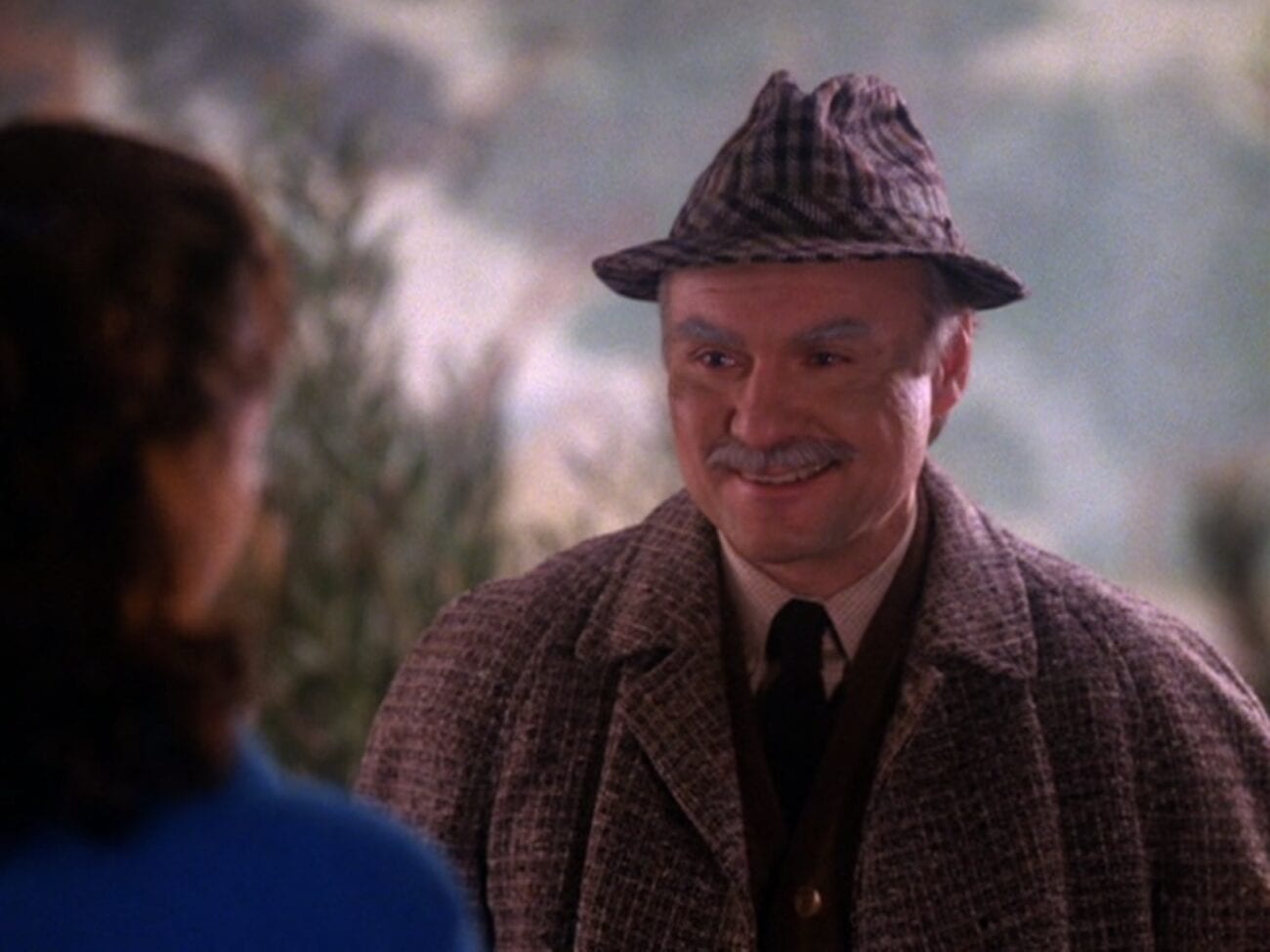
Windom Earle
Windom Earle is a joy to behold in this episode. Leo fetches the master’s slippers, pipe, and newspaper—like a stereotypical family dog—as Earle extols the virtues of country life. Earle merrily turns to the classified ads to find Cooper’s next move in their chess match. When he realizes Cooper is trying to play for a stalemate and is undoubtedly getting help, he becomes enraged and beats Leo with his shakuhachi flute. He then gets himself back under control, restrainedly affirms, “Many people are going to regret this,” and plays a calming tune.
More so than his bipolar mood swings, it’s Earle’s running around town in disguise that is the real fun. In Episode 24, we get two of his best efforts. First up, he visits Donna at the Hayward home, posing as an old school chum of her father, Dr. Gerald Craig. While this costume is simple, Earle put a lot of work into the makeup, even coloring his eyebrows grey. In character, he’s funny, charming, and understanding, making a wonderful sounding board for Donna’s gripes about small towns and high school. All of this makes the underlying malice of the scene all the more palpable. He has Donna, one of his three targeted queens, all alone inside the house, away from any potentially prying eyes. Anything could happen.
He later visits the Double R Diner as a grungy biker dude to check in on one of his other queens, Shelly. Earle catches wind of her discussion about the upcoming Miss Twin Peaks pageant and encourages Shelly to enter because she’s “very pretteh.” A little creepy, perhaps, but without any of the potential menace of the previous encounter.
While there, he witnesses the first meeting of Cooper and Annie. Even from afar, he can sense their instantaneous connection, as he did with Dale and his wife Caroline many years before. Cooper, always a stronger sender than receiver, senses Earle’s threatening presence just a tad too late, looking over at the empty seat, the biker’s burger and fries left untouched.
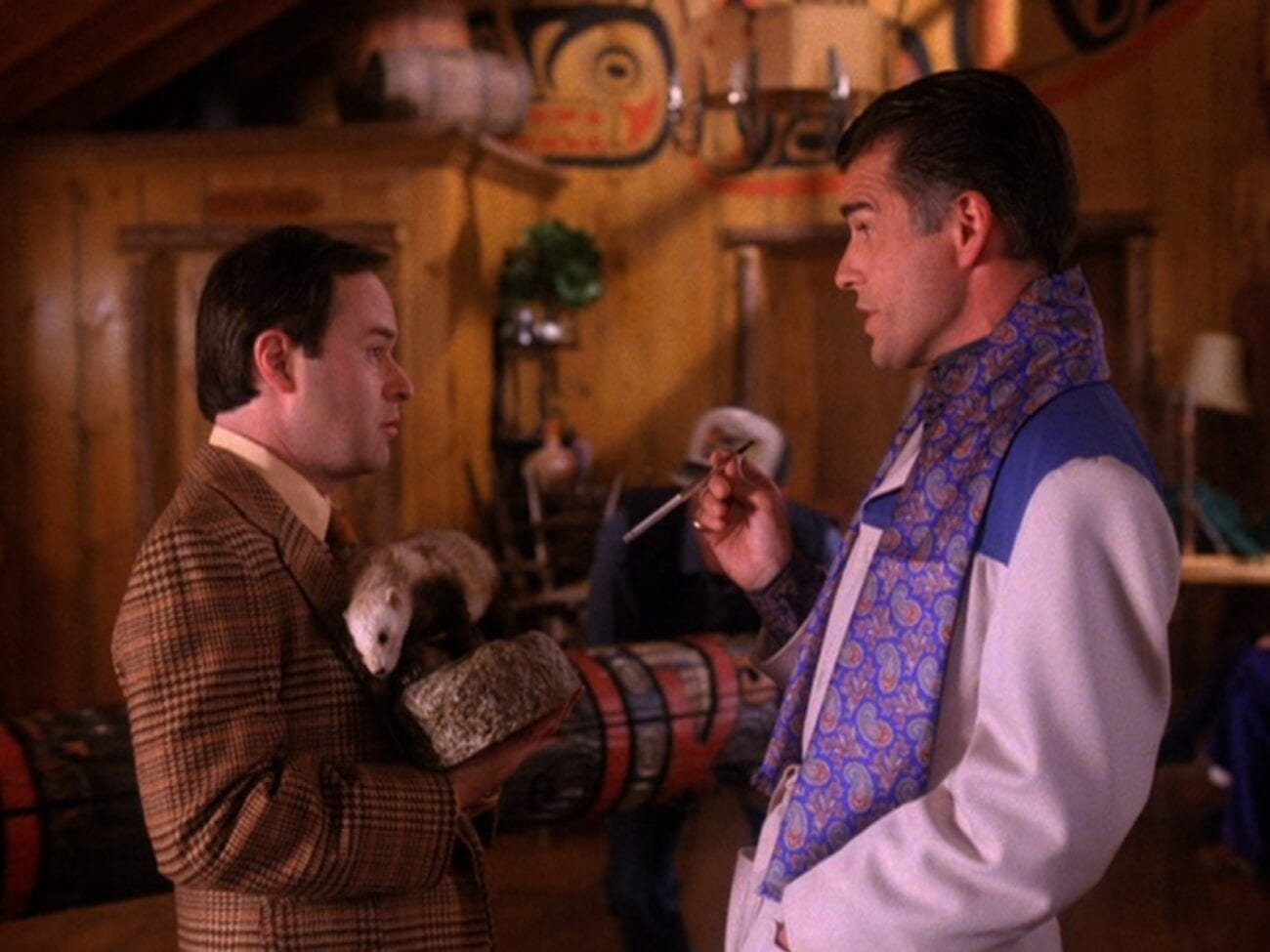
Pine Weasel Riot
The crown jewel of this episode, and the thing I always remember the most, is the “Stop Ghostwood” fashion show. If you wanted evidence that Lynch and Frost had returned to the helm of Twin Peaks by this time, here it is. However, you can only truly understand that after you’ve watched the other Lynch-Frost television series, On The Air.
On The Air would air in the summer of 1992, a year after Twin Peaks Season 2. It is set in 1957 and follows the cast and crew of “The Lester Guy Show,” a weekly live variety show. Preparations and rehearsals mostly go well, but when they go “on the air,” everything that can go wrong does go wrong. Think 30 Rock, but set in the 1950s. Sadly, it was about 15 years ahead of its time, and ABC did everything in its power to kill it.
Suffice to say that both the fashion show in Episode 24 and the Miss Twin Peaks pageant in Episode 28 are obvious progenitors to On The Air, or at least experiencing some serious cross-pollination from its origins in showrunners’ minds: the constant chaos in the background during rehearsals, the petty bickering and plotting between stars, the disastrous end to the big final number. The “weasel-cam” and the screaming model especially exemplify the sense of humor that fueled the Lynch-Frost partnership back then. Both Ian Buchanan (playing Dick Tremayne) and the late David Lander (as Tim Pinkle) would go on to star in On The Air, along with a few other actors plucked from the Twin Peaks repertory company.
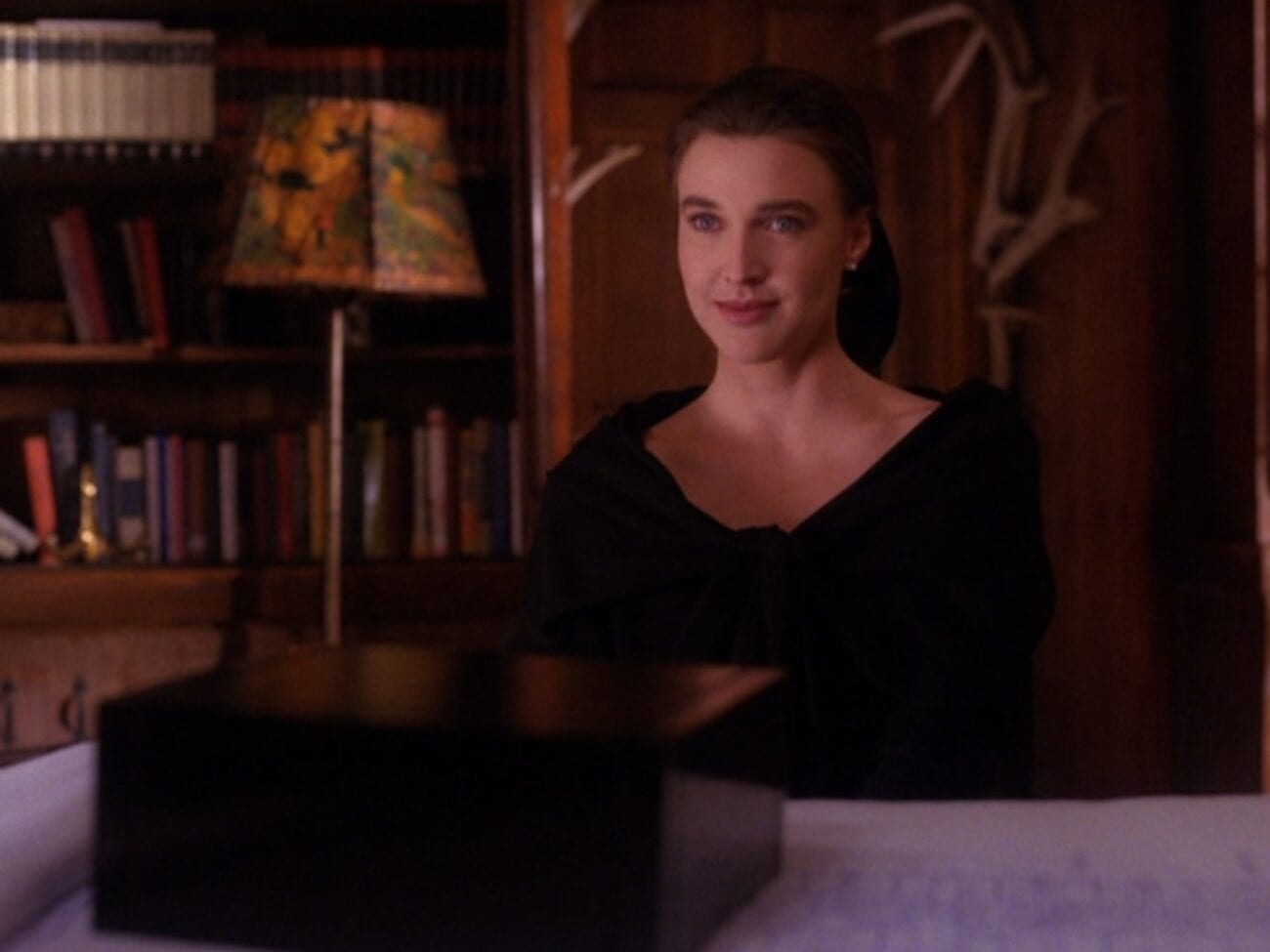
Jones
There is often confusion about the final scene of Episode 24, when Thomas Eckhardt’s assistant, Jones, sneaks into the Bookhouse, knocks out the guard, and climbs into bed with Harry. To this day, people still wonder what she’s doing and why she’s doing it. In the next episode, she will try to kill Harry, drugging him to make him hallucinate that it is Josie doing it.
For those paying close attention, this assassination attempt is actually set up in Episode 23, in this conversation between Eckhardt and Andrew Packard:
Andrew: Thomas. Love will break your heart. Happily, long ago, I lost interest. But Josie loses her heart with alarming regularity. The local sheriff, of all people.
Eckhardt: I have taken care of that.
Andrew: I don’t doubt it.
Prior to his death, Eckhardt apparently gave Jones directions for a couple of tasks around town. The delivery of the puzzle box to Catherine may have been a contingency in case of his death, but killing Sheriff Truman was on the agenda regardless. The Twin Peaks Unwrapped podcast confirms there was a deleted scene that showed Eckhardt handing over a large amount of money to Jones as payment for the hit. It was, as Agent Cooper would later surmise, a case of “sexual jealousy.”
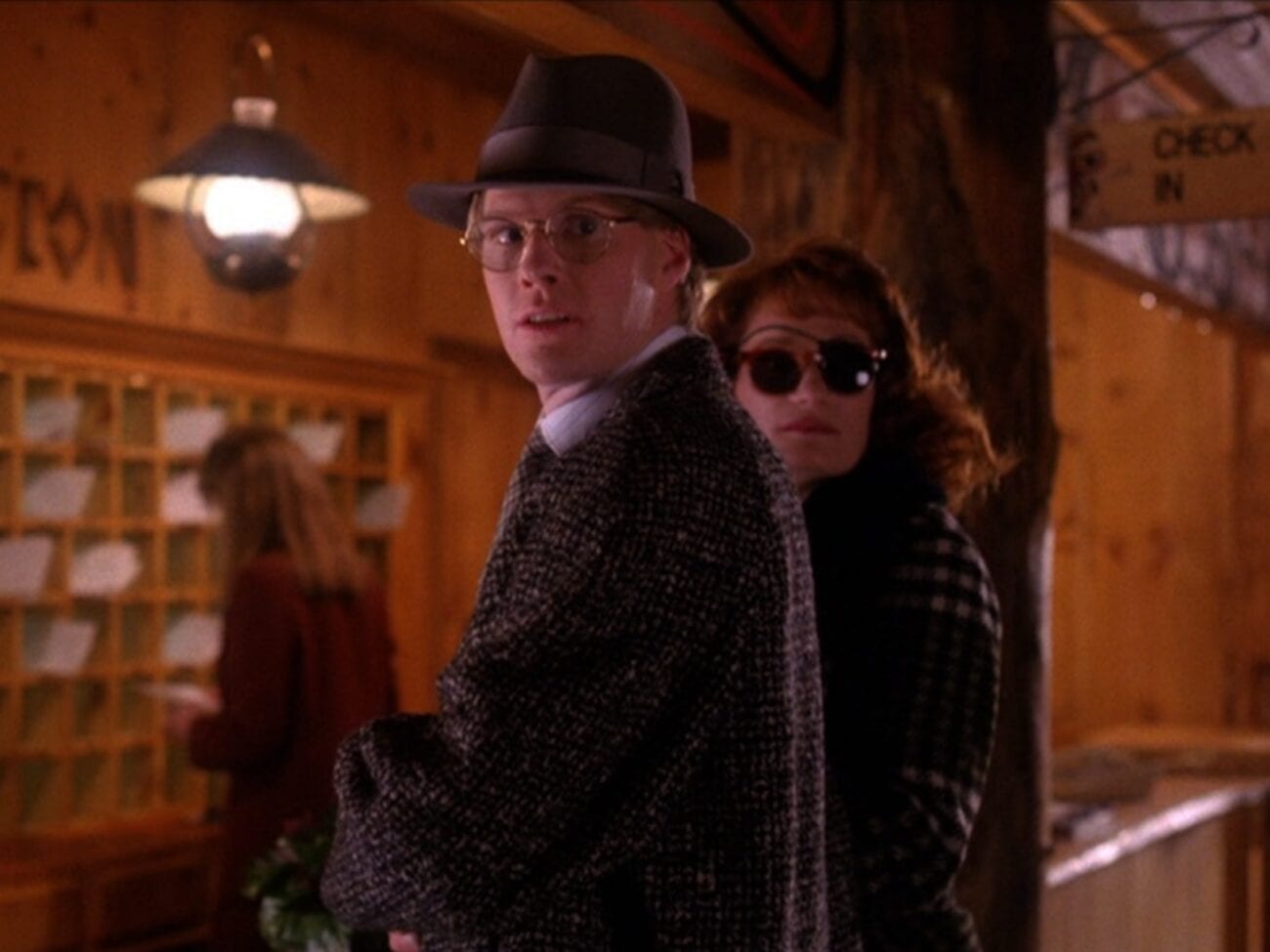
Quick Takes
- There’s a strange moment at the end of the first scene with Earle and Leo where the camera zooms in on Earle’s ring (which can be ordered on Etsy). It’s a silver wire ring with a simple Celtic knot design. However, in the screenplay, it’s described as a “glistening emerald ring.” Was it originally supposed to be the Owl Cave ring, or some variant on that design? Either way, it’s never referenced again.
- When Pete is discussing chess strategies with Cooper, he mentions “the classic Herbstmann.” Alexander Osipowitsj Herbstmann was a Russian chess master who published around 300 studies of chess matches.
- Pete goes on to say, “The classic Herbstmann leaves you with six pieces. Now I can improve on that, but even if I get there in half the time and keep 12, that means six people will die.” A chessboard has 16 pieces on each side. If you keep 12, you would only have lost four, not six. Maybe Pete would have better luck at checkers after all.
- Earle offers Donna the advice, “Now, don’t knock small towns until you’ve lived in the city.” It’s advice she would not take to heart until more than 20 years later.
- Mike Nelson’s disguise as Mr. Hinkman, checking in with his wife at the Great Northern Hotel, is a solid effort that is almost up to Windom Earle’s standards. If Mike had just gone for a fake mustache, as Earle did with his Dr. Craig disguise, I think he could have gotten away clean.
- Ben Horne introduces Dick as “Richard Treeman,” completely butchering his last name and showing just how much he thinks of his department store employee.
- Catherine quips at Ben, “Well, if it isn’t John Muir, friend of the redwoods.” John Muir was a naturalist whose activism led to the establishment of Yosemite Nation Park in 1890 and the founding of the Sierra Club in 1892.
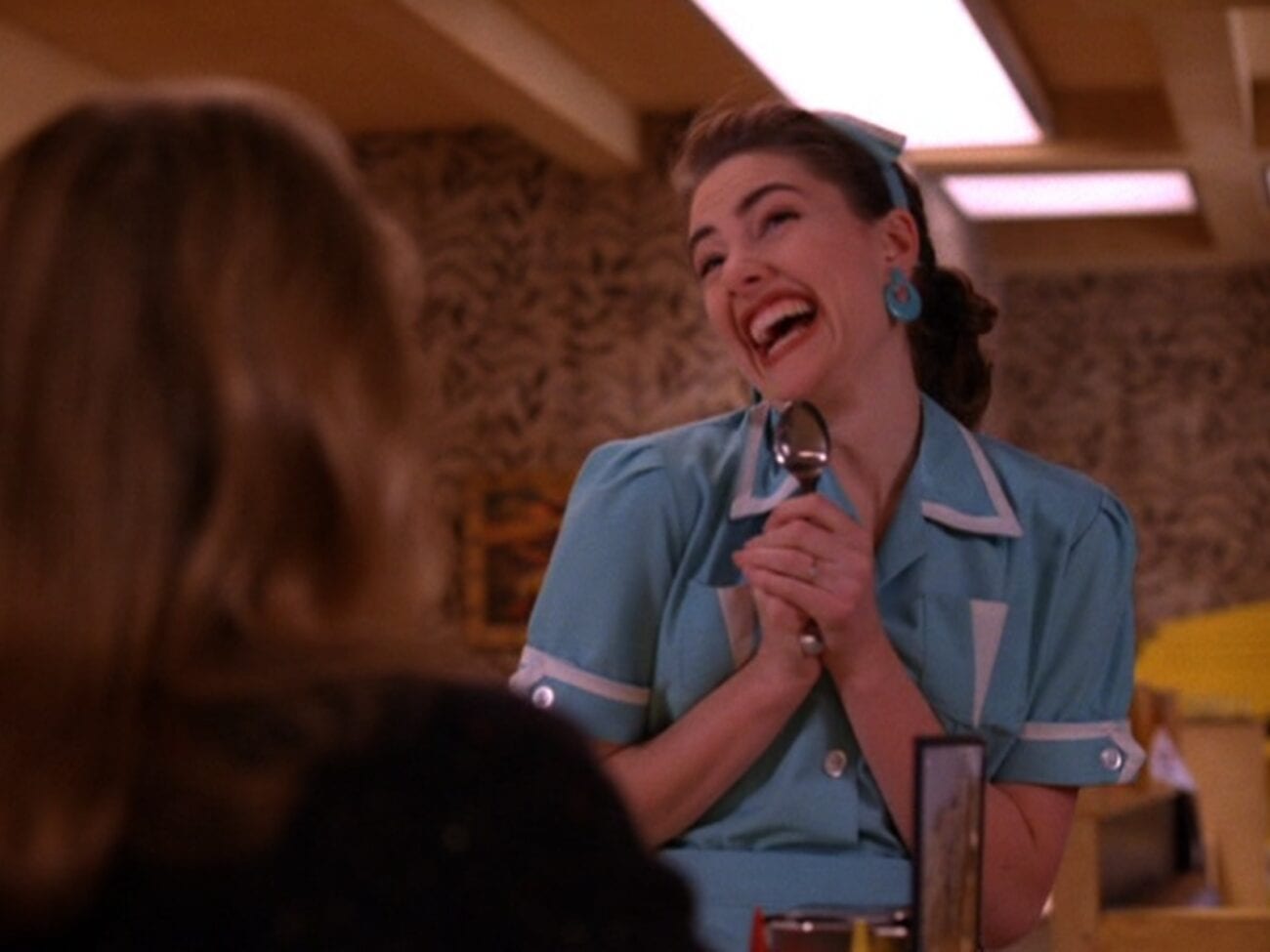
Best Lines
- “It’s a pretty simple town. Used to be. I guess the world’s just caught up to us.”
- “Maybe we’d better just whistle on our way past the graveyard.”
- “Shelly’s like family.” “With our family, that’s not exactly a character reference.”
- “Tacit agreement is acceptable, Leo. Your silence speaks volumes. Or if not volumes, at least the occasional, unpunctuated paragraph.”
- “You two should coordinate.” “You are dreaming.”
- “I don’t know how to cook.” “I’ll bet you someone in the kitchen does.”
- “But what I’m trying to make clear is that using a stuffed animal to represent an endangered species as an ecological protest constitutes the supreme incongruity.” “Well, that’s clear, Dick.”
- “They’re going to be buried side by side.” “So they can keep an eye on each other.”
- “No jealous rages. Well…maybe just one.”
- “Miss Double R Diner, what would you do to bring about world peace? Well, I would bring all the world’s leaders together, make them form a circle and join hands. Because you can’t make a fist holding hands.”
- “It’s an inner thing, you know.”
- “I would just like to remind all of us that ecology is not a luxury science. It is not about pleasant appearances. It is about survival. About whether we are all going to make it, period.”
- “I don’t understand. There’s a whole lot I don’t understand.” “We’re all like that.”

